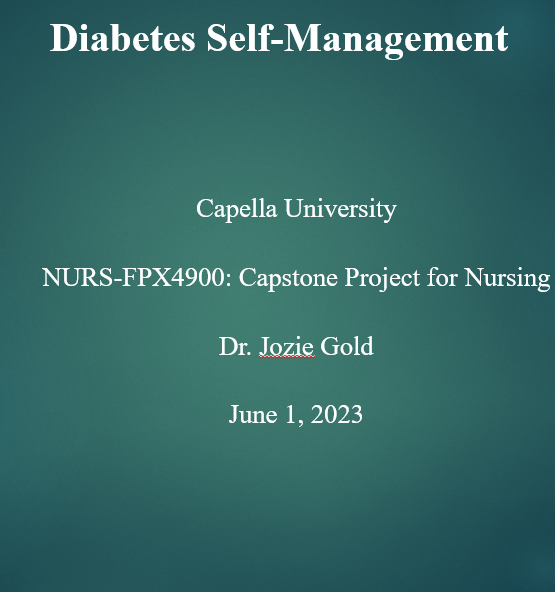


Diabetes Self-Management
Capella University
NURS-FPX4900: Capstone Project for Nursing
Dr. Jozie Gold
June 1, 2023
Availability:In Stock
Hi everyone. Thank you for being part of this session. I will focus on diabetes as one of the serious threats for individuals, families, and communities across the United States. The National Institute of Diabetes and Digestive and Kidney Diseases (2023) indicated that there are about 28.7 million people of all ages diagnosed with diabetes in the United States. The figure represents 8.7% of the population. Similarly, the National Institute of Diabetes and Digestive and Kidney Diseases (2023) indicated that 28.5 million are adults ages 18 years or older. Adverse social, health, and economic impacts reminds healthcare providers to dedicate efforts toward reducing health disparities. This educational session captures serious consequences of uncontrolled diabetes such as damages to the heart, stroke, and high cost of care. The negative outcomes call for consistent monitoring and controlling of symptoms. In this sense, I will focus on diabetes self-management as a viable and sustainable intervention for patients in low-income communities to take ownership of their health and well-being. The approach allows individuals to identify individualized care plans appropriate for encouraging consistent monitoring and managing of symptoms.
For this educational session, I identified diabetes self-management as an evidence-based and patient-centered approach for optimizing care outcomes. Patients embrace individualized care practices such as routine exercise, more non-starchy vegetables, such as broccoli, spinach, and green beans, fewer added sugars and refined grains, such as white bread, rice, and pasta. Patients should also focus on whole foods instead of highly processed foods as much as possible. Self-care practices also include alcohol moderation, weight management, and self-monitoring of blood glucose levels (Schmitt et al., 2022). Patients should learn to use remote symptoms monitoring devices for consistent assessment of blood glucose levels across the care continuum (Dhatariya et al., 2020). Healthcare providers should initiate conversations on barriers and enablers of successful diabetes management. The discussions make everyone dedicated towards scaling health promotion and education and informing patients about the need for consistent positive health-seeking behaviors and attitudes.
Reviews
There are no reviews yet.